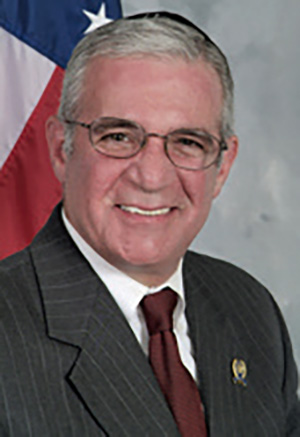


Recent violent attacks on Jews in the New Jersey/New York area have added a strong new sense of urgency to conversations in the Jewish community about shul security. Responding to these concerns, New Jersey Assemblyman Gary Schaer (D-Passaic) has partnered with Republican colleagues Assemblyman Ronald Dancer (R-Monmouth) and Assemblyman Jay Webber (R-Morris) to propose a new law that would open up a new security option to shuls throughout the Garden State—one that may delight some shul leaders and dismay others.
The assemblymen submitted assembly bill #1255 for consideration in the 2020 New Jersey Assembly’s legislative session. The bill allows each place of worship in New Jersey to designate one member of the congregation who can carry a handgun for the purpose of protecting the shul, church, or mosque.
The bill mandates that the designated armed congregant will be required “to participate in a training course for the use, handling and maintenance of firearms held by the Police Training Commission, the Director of Civilian Marksmanship, or by a recognized rifle or pistol association that certifies instructors.”
The bill is only applicable to “an assembly of the adherents of any religious sect or denomination registered as a not-for-profit organization pursuant to section 501 (c)(3) of the federal Internal Revenue Code … for the purpose of prayer or any other form of religious worship.” This clause appears to exclude smaller and more informal shuls, such as house minyanim, prayer groups or “shteibels.”
The bill allows that the designated armed congregant “may serve the place of worship in a voluntary capacity or for monetary compensation” and that shuls, churches, or mosques are not restricted to just the armed congregant for protection: “The provisions of this section shall not limit a governing body of a place of worship from employing an armed security guard, pursuant to the Security Officer Registration Act P.L.2004.”
Assemblyman Schaer told The Jewish Link: “The shootings in Jersey City, Pittsburgh, Poway and Charleston have done irrevocable damage to communities that will never be whole, but we still have not found an answer to guarantee these tragedies never happen again. This legislation starts a conversation about how we can prevent future violence and allow residents to feel safe in their own communities.”
Though a companion bill has not yet been proposed in the New Jersey State Senate, Senate President Steve Sweeney commented on A1255 by stressing how seriously he takes efforts in this area. He stated to The Jewish Link: “The governor just signed into law legislation I cosponsored that will provide $2 million to enhance security at synagogues and other places of worship. We also expanded the scope of the grant program to include ‘target hardening’ equipment, such as cameras, barriers and cyber security measures, and to hire security personnel. Synagogues and other places of worship will be better protected with this support. We won’t allow bias or hate to intimidate anyone from practicing their religion or joining together in places of worship. No individual, group or organization should be left vulnerable to any threats or acts of violence because of their race, religion or heritage.”
One possible concern that Jewish community leaders might have with the provisions of assembly bill 1255 is that they run contrary to the recommendations in the report, “Firearms and the Faithful: Approaches to Armed Security in Jewish Communities,” released in January 2020 by the Secure Community Network (SCN).
SCN is “the official safety and security organization for the North American Jewish community,” which was founded in 2004 under the auspices of the Jewish Federations of North America and the Conference of Presidents of Major American Jewish Organizations. According to the report, SCN “serves as the Jewish community’s formal liaison with federal law enforcement and coordinates closely with federal, state and local law enforcement partners on safety and security issues related to the Jewish community.”
The “Firearms and the Faithful” report, drawn from an August 2019 consultation with nine recognized national authorities in communal security, states as its primary recommendation (p.3): “If a congregation determines that armed security will be part of its plan, then this paper should help it reach the conclusion that employing a uniformed police officer is the option most likely to achieve its goals.”
Assembly bill #1255 is still in the early stages, as the current version available online notes in its cover sheet that it was “Introduced Pending Technical Review by Legislative Counsel.” The Jewish Link intends to continue to cover this significant legislation as it advances towards passage.
By Harry Glazer
�









